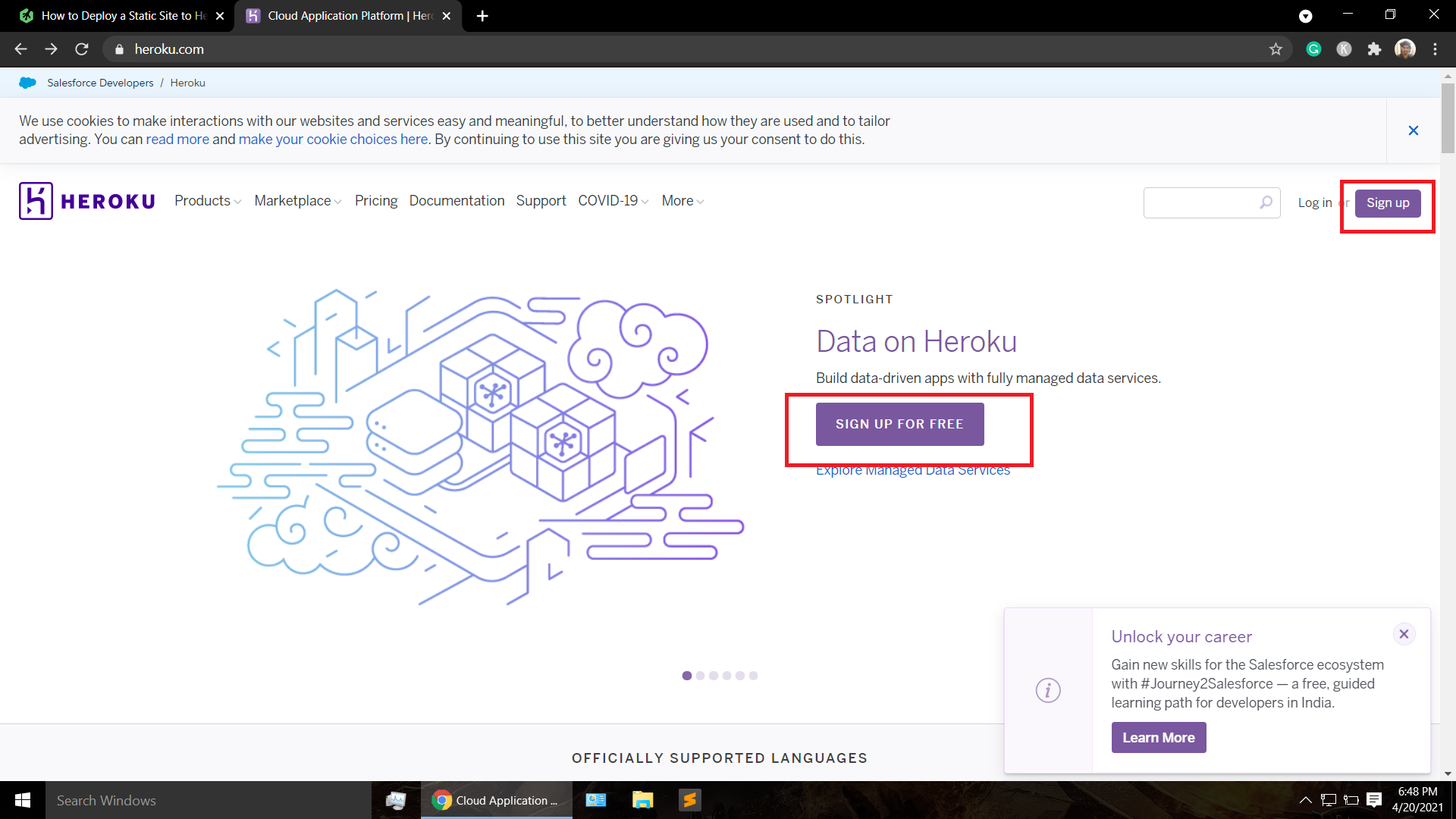
Heroku is a cloud Platform as a Service (PaaS) that runs on containers (PaaS). Heroku is a platform that allows developers to deploy, manage, and scale modern apps. Our platform is elegant, versatile, and easy to use, making it the quickest way for developers to bring their apps to market.
Heroku is completely operated, allowing developers to concentrate on their core product rather than worrying about servers, hardware, or infrastructure. The Heroku experience includes resources, software, workflows, and multilingual support, all of which are geared toward improving developer productivity.
Learn more about our goods, pricing, freebies, language support, and the Elements Marketplace.
When it comes to deploying an application, there are typically two options: a virtual private server (VPS) or a platform as a service (PaaS) (platform as a service). This article will teach you how to use a PaaS like Heroku to deploy an application to output.
Many developers are looking for a free cloud web hosting service that will allow them to run their apps, blogs, or bots without having to worry about managing servers. Others are intrigued by the platform-as-a-service model but are hesitant to invest. Here`s a rundown of the Heroku platform`s and ecosystem`s free cloud services for developers.
Heroku`s free cloud services start with apps, which can be deployed to dynos, the Heroku platform`s lightweight Linux containers. When you sign up for Heroku, you`ll be given a pool of free dyno hours to use for your apps right away. Your app uses dyno hours as it runs. Your app will avoid consuming dyno hours when it idles (automatically after 30 minutes of inactivity) or when you scale it down. You can deploy your free app as many times as you need (we encourage continuous deployment), and your app will be live and publicly available as long as you have dyno hours.
Make the most of your free platform services.
Verify your Heroku account with a credit card to get 1000 free dyno hours; unverified accounts get 550 free hours. Unless you want to use a paid service, you will not be charged. Account registration comes with a slew of other perks, including the ability to run more than five free applications and free custom domain names.
Make use of web tools that are friendly to developers.
You have access to the same free platform resources and open-source components if you use free or paid services, which will make your life a lot easier.
1. Dashboard for Heroku
Heroku Dashboard is an essential part of the Heroku platform experience for managing, scaling, and monitoring your apps.
2. CLI for Heroku
Use the Heroku CLI, a downloadable application for Windows, Mac, and Linux, to deploy and control your free apps from the command line.
3. API for the Heroku Platform
Heroku`s Platform API allows you to simplify, expand, and integrate Heroku with other resources programmatically.
4. Heroku Buttons
Heroku Buttons make it easy to customize and deploy third-party modules, libraries, and pattern apps with just one click. Over a thousand free Buttons are available from open-source reports in the Elements Marketplace.
5. Heroku BuildpackssBuildpacks are open-source scripts that automate the build processes for your preferred languages and frameworks. Choose from over a thousand free buildpacks created by Heroku.
Now lets us know step by step to host a website in GitHub for free in an easy way.
Step by step to host a website in Heroku.
Step 1: Host files in GitHub first click here to know how to host a website in GitHub,
Step 2: Open Heroku with the link https://www.heroku.com/.
Step 3: Open the sign-up page in Heroku to sign up with your details.
Step 4: Once you sign up in Heroku click on the login page and sign in to Heroku.
Step 5: After successful login, you will see the dashboard page in Heroku and click on the new app button.
Step 6: After clicking the new app enter your App name and select the country and click create an app.
Step 7: After creating an app you will see deploy and click deploy and connect the Github.
Step 8: Click on connect GitHub to deploy the website from Github.
Step 9: To connect to GitHub so click on Connect the authorized Heroku.
Step 10: After connecting successfully search for the repository on the GitHub page.
Step 11: Once you find the repository click on connect to the repository.
Step 12: After successfully connecting click on the Deploy branch.
Step 13: Once you successfully deploy the projects from GitHub you will find a green tick and after a click on the view button to view the page.
Step 14: After deploying successfully we will find the link like this https://nikhilkeshav-react-app.herokuapp.com/
Now let`s see how to host in Heroku,
Step 1: Given the below picture is hosted the files in GitHub and click here to know how to host a website on GitHub.
 100%" height="auto">
100%" height="auto">
Step 2: Open the Heroku website www.heroku.com/ using this link to sign up or login page.

Step 3: Open the signup page in Heroku and fill in all the details in Heroku and click on create an app in Heroku.

Step 4: Once you signup did verify your account in Gmail and click on the login page in Heroku, login in the Heroku with your username and password.

Step 5: After Successful login with username and password you will find the admin dashboard of Heroku and you will find the workspace of projects and so on, on the dashboard click on the new button to create a new app to host a website in Heroku.

Step 6: After clicking on the new app you will find to enter the app name and country select options on the page, choose a unique name for the app and select the country to host, then click create app button to create a Heroku page.

Step 7: once you create a page goes to the deploy page in the folder and link your GitHub page to Heroku.

Step 8:After the link to GitHub connects to GitHub with authentication.

Step 9: After clicking Connect to GitHub pop-up window is appear to authorize the GitHub account to Heroku as given below.

Step 10: After successfully connecting to Heroku you will find options to search repository files that are already created in GitHub enter the proper repository file in the input field and click on search.

Step 11: once your repository finds in your GitHub account click on connect in Heroku to connect your GitHub project folder to Heroku to host.

Step 12: After connect button click it automatically deploy all the dependency which is created in package.json and all dependency added to your projects in Heroku.

Step 13: After successfully deploying and uploading the files successfully then you will find a green click and view button in the dashboard this means the website is added successfully and ready to view the website with the Heroku link and also indicated the website is active in google.

Step 14: After clicking on the view button you will find the hosted website link on https://nikhilkeshav-react-app.herokuapp.com/ format the website is active in Heroku and you can share this link with others.

Heroku is one of the best ways to host a static website and a dynamic website online and it also supports PHP, nodeJS, java, reactJS, and so on.
